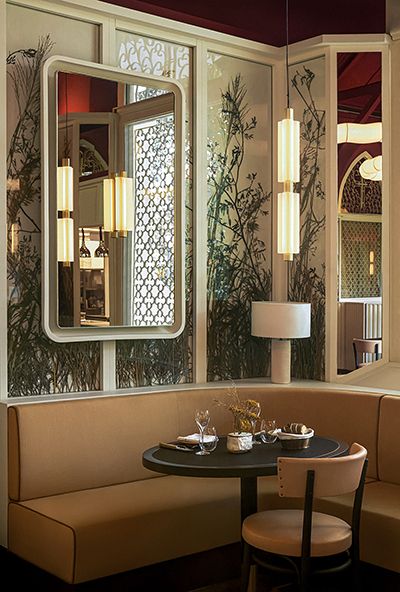This former chapel-turned-French restaurant tucked away in Dempsey will be brimming with life from mid-November
Claudine is a long time in the making. After a year marred by widespread challenges, the long-awaited French restaurant by chef Julien Royer and The Lo & Behold Group will launch on November 16. The French cuisine is inspired by honest home cooking and generous meals, from timeless classics to the chef’s personal recipes. Royer describes Claudine’s concept as eclectic, convivial, and presents a certain “joie de vivre”.
Occupying an old chapel (former White Rabbit space) at Dempsey Hill, Claudine has undergone careful conservation, from the colourful stained glass to the mosaic floor.
Natural light streams into the main dining hall, which is decked out in dark earthy red, and soften by delicate foliage and botanicals. The design firm responsible for the interior is Nice Projects, co-founded by Singapore-born Sacha Leong and Simone McEwan—both worked on this project remotely in London and Sydney, respectively. Under the direction of Nice Projects, the botanical panels adorning the restaurant were created by This Humid House.
Claudine’s young and energetic team includes executive chef Julien Mercier who was in Brazil prior to moving to Singapore; the French chef had worked together with Royer 15 years ago in the Caribbean. Working alongside Royer and Mercier is chef de cuisine Loïc Portalier, former sous chef at Louise in Hong Kong; general manager Glynn Tay; and sommelier Geoffrey Leotot.
We find out more from Royer on what diners can expect from this new restaurant.
Don’t miss: Julien Royer of Odette on Finding Hope in Challenging Times

Could you share more about Claudine's concept, and how different it will be from what's available in Singapore?
Julien Royer (JR): Claudine is a French restaurant named after my mum. It’s linked to my roots and who I am. In Singapore, there are many bistro and brasseries, and also high-end French restaurants. I thought that we have a gap in the market to fill in between this. Claudine is a place where you can go for great French cuisine that is friendly, well-executed and produce-focused, using the same quality of ingredients as a Michelin-starred restaurant. The cuisine will be French with a lot of different influences, including from my region. For example, we’ll have truffade (sauteed potatoes with Cantal cheese and garlic) or chou farci (stuffed cabbage with pork)—typical traditional family recipes that my mum would cook.
There will be classic French dishes like the vol-au-vent—puff pastry filled with glazed veal sweet bread, morel mushroom and chicken comb—a really classic Escoffier recipe. We will have homemade charcuterie, oreiller richelieu (flat version of pate en croute), foie gras nougat and tarte soufflee au chocolat. You can also find other things like pasta with Hokkaido uni, and some Southeast Asian touches, such as a classic baba, balanced with mango, calamansi and passionfruit glaze.
The à la carte menu is going to be quite extensive. It’s how I envision a French restaurant to be in 2021—it won’t be too old school or traditional, but it will be eclectic.
What were some of the lessons learned during the pandemic?
JR: When we did Odette at Home during the pandemic, we kind of simplified the cooking of Odette and brought it to people’s homes. The food filled their stomachs and spirit with happiness which was great. It was a successful and interesting exercise, and it opened my eyes to something different.
At the end of the day, fine dining is what I love to do and something I will always do. But how often can you go to a fine dining restaurant like Odette and Les Amis? You may not want to spend three to four hours at the table every single time you go out [to a fine dining place]. Here, you can come every month or more. The menu is bigger and more flexible. You have the same quality as a Michelin restaurant, the same precision of cooking, and the same focus on cooking skills. That’s the idea—to bring the same level of attention and sourcing of ingredients—but to do something a little bit more casual, approachable, flexible, and targeting a much wider audience.
In case you missed it: Michelin Guides’ Gwendal Poullennec on What He Learned Over the Covid-19 Pandemic



